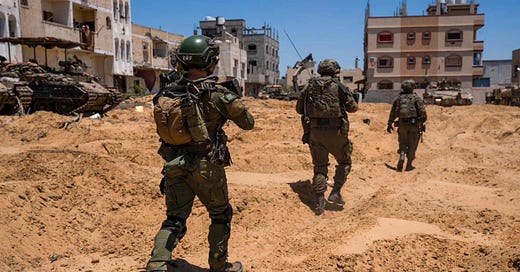Former Top Diplomat: Assault on Rafah Not Helping Israel or US
It's time to ask some larger questions, Haass says
Debate over whether Israel’s current attack on the city of Rafah in southern Gaza has crossed some “red line” for President Biden is asking the wrong question, according to a prominent expert in foreign affairs and a one-time top State Department official.
Israeli military continues its push into Rafah, despite warnings from the US government and killing dozens of Palestinians.
Israel began its current military operations in Gaza following the October 7, 2023, Hamas attacks.
While more than 1,100 Israelis died on October 7, nearly 37,000 Palestinians have been killed. Most of the Palestinian dead have been young children and women.
One Israeli strike reportedly eliminated two Hamas targets at a cost at least 45 Palestinians their lives and inflicted gruesome injuries on scores of others when the strike ignited a large fire that tore through a nearby encampment.
While the Biden administration on Tuesday expressed sympathy for the Israeli airstrike over the weekend, it signaled it did not violate President Biden's “red line” for the offensive and that the United States would wait for results of a full Israeli investigation before taking any action.
Focusing on that so-called “red line” is the wrong topic, according to Richard Haass, former longtime president of the Council on Foreign Relations and a top diplomat and adviser in the State Department during the administration of President George W Bush.
“Israel is obviously decided to continue to degrade Hamas. There’s some major military elements of Hamas left. But here’s the ‘but.’ In the course of doing it, you had this sort of incident the other day where 40-plus innocents got killed,” Haass said Wednesday during an appearance on the MSNBC program, Morning Joe. “That’s inevitable. That’s, as [former defense secretary Donald] Rumsfeld once said, ‘Stuff happens, awful stuff happens, and that sort of thing is going to happen again and again.’
“This further isolates Israel, further builds anti-Israeli feeling in this country and around the world, makes it impossible for the Saudis to normalize [relations], becomes a recruiting tool for future generations of Palestinians. And it still doesn’t solve the problem of what comes next,” he added. “So the question the administration has to ask, it’s not whether Israel crossed the red line, that seems to me too technical, too narrow. The real question is, ‘Is this still wise? Is this worth it? Is this helping Israel? Is this helping the United States?’ So the question is not how Israel’s going about it now, the real question is whether it still makes sense.
“And I think the United States has to really raise the question: Should we be supporting a ceasefire, that the benefits of this Israeli operation don’t outweigh the costs?” Haass said. “Obviously, you’re not going to get any hostages back so long as this gets on and it’s still not going to deal with the fundamental challenge of how to govern Gaza, much less the West Bank. So I actually think the first order question is not this red line issue. I think for the administration is whether to come out publicly against what Israel is doing.”
Please support our work…
Please subscribe…




